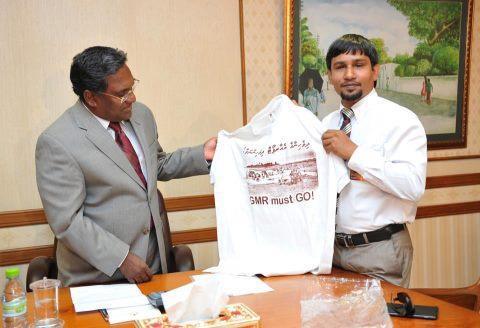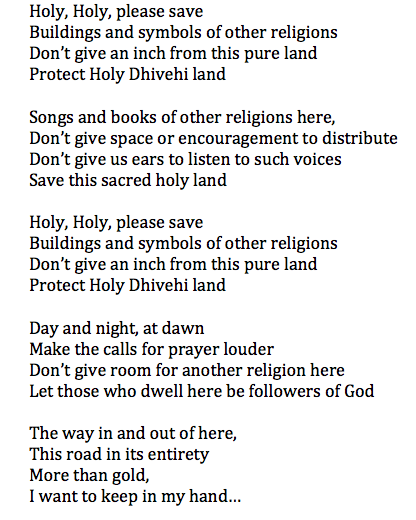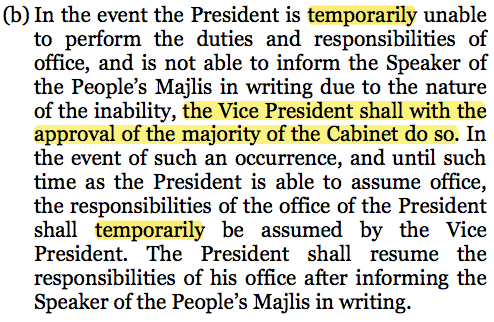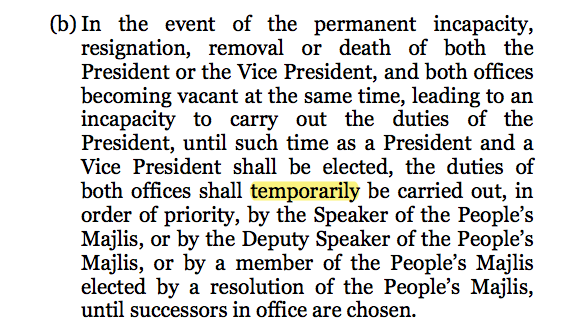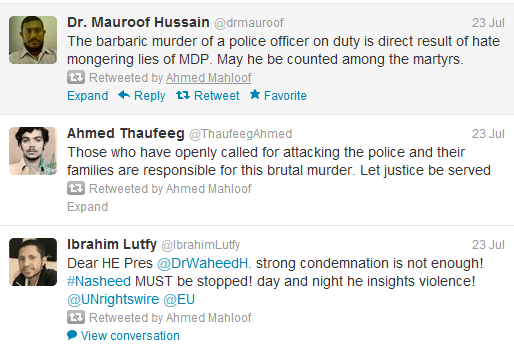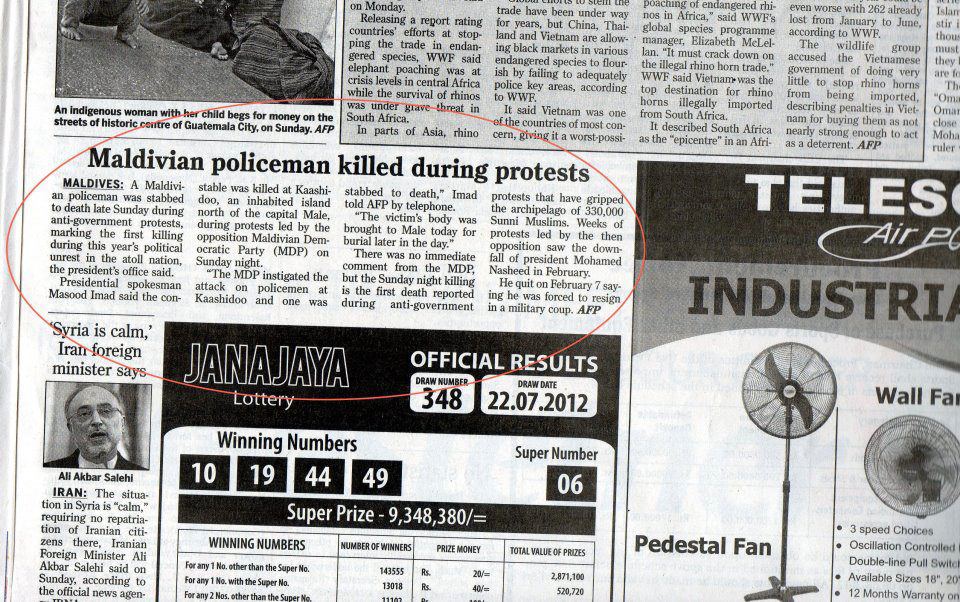This article originally appeared on DhivehiSitee. Republished with permission.
Islamic extremism is very real in the Maldives. It affects the daily lives of every Maldivian, and is gaining in scope, intensity and violence every day with the pseudo-democratic government that came to power on 7 February.
This is not to say that Islamic extremism did not exist during the three short years in which the Maldives was a democracy. On the contrary, it was during democratic rule that extremism gained its strongest foothold in Maldivian society. It is a myth that democracy is an antidote to extremism, as is widely proposed in much of the existing anti-radicalisation literature. Democracy, with its many freedoms, provides a much more conducive environment for radicalisation than does an authoritarian regime, as has been seen in the Maldives.
When Islamic extremism began to be imported into the Maldives in the late 1990s with the advent of the so-called international ‘religious terrorism’; and when the export of extremist ideologies intensified globally with the War on Terror, the Maldives was under the dictatorial regime of Maumoon Abdul Gayoom.
Although in recent times Gayoom has aligned himself with the ideologies of the hardline Islamist Adhaalath Party, during his rule, he presented himself as a moderate Muslim who believed in freedom of religion and advocated religious pluralism in the Maldives.
What he did not tolerate was extremist ideologies spread in the name of Islam. His methods of suppressing such beliefs – imprisonment and torture – cannot be condoned, nor are they compatible with the values of democracy. It cannot be denied, however, that they held Islamic extremism in check in the Maldives for over a decade.
The transition to democracy in November 2008 opened the door for Maldivian Islamists to push their agenda forward.
A confluence of events had helped them consolidate support even under Gayoom’s repressive policies: the 2004 tsunami which literally put the fear of God into many a Maldivian living on remote islands, and which the Islamists exploited as a means of spreading their ideology by depicting it as punishment from God for man’s ungodliness; and the War on Terror, which was used by Islamist states and movements to intensify their efforts to fund and spread their ideology to Muslim populations across the world.
Despite a tourism industry worth billions of dollars, three decades of authoritarian rule in the Maldives left behind a population that was mostly on the poverty line, had extremely low levels of education, and contained tens of thousands of disaffected youth with few prospects for social mobility or economic success. All are factors that have been shown to facilitate the spread of extremist ideologies.
Added to this was the supposedly inescapable need for the newly democratic government to form a political alliance with the Islamists, and a democratic president who believed in freedom of expression in absolutist terms, and who failed to fully appreciate that such freedoms are not always exercised with responsibility by those who enjoy them.
While during the War on Terror most democratic governments everywhere sought to find a balance between freedom of expression and the need to curb incitement to violence in the name of religion, under Mohamed Nasheed’s government Maldivian extremists enjoyed absolute freedom of expression.
Bookshops came to be laden with publications that spread their teachings; their message was constantly transmitted in mosques, on air, and on the Internet. The success of their efforts are now there for all to see.
Of course, under Nasheed’s government it was not just the extremists who had the freedom to express their views. Those who disagreed with their ideology, too, enjoyed the same freedom. This was, in fact, Nasheed’s strategy and hope: that the civil society would counter extremism without requiring any intervention from the government.
It was a huge mistake. The civil society was not strong enough to take on the Islamists, especially in the face of the institutional support that the Islamists enjoyed under the MDP (Maldivian Democratic Party) government with its politically expedient alliance with the Islamist Adhaalath Party. Nasheed also underestimated the power of the label of ‘un-Islamic’ or anti-Islam as a tool for suppressing dissent.
The fight against extremists was thus left to individuals who worked alone or in very small groups. Their discourse was easily slapped down and condemned by the extremists using the ‘anti-Islam/un-Islamic/heretic’ label. As it turned out, this label was also the most powerful tool used against Nasheed himself to help facilitate the downfall of the MDP government, demonstrating just how much power such a designation wields in a rapidly radicalising society.
Despite the knowledge that Nasheed was a firm believer in freedom of expression, few dared to take on the extremists openly then, or now. When they did, the MDP government utterly failed to support them. The lack of any assistance or support for Mohamed Nazim, who in May 2010 dared to publicly declare his disbelief in Islam, and of Ismail Mohamed Didi in July 2010 who felt persecuted for his lack of belief and committed suicide at the age of 25, brought into sharp relief the absence of any serious commitment by the MDP government to fighting extremism.
Instead of tackling the oppression that the Islamists were imposing on Maldivians, the MDP – beleaguered by continuous authoritarian attempts at a reversal – often chose to ignore the problem, or worse, sided with the Islamists.
With the regime change of 7 February, the problem has grown acutely worse. Not only did the new caretaker President Dr Waheed enthusiastically demonstrate a previously unknown affinity with Islamists, his Coalition Government has, from the beginning, continued to deny extremism even exists in the country.
This deliberate denial, coupled with the appointment of Islamists to top positions in government and society, has resulted in the opportunity for extremism to grow unchecked. It now has deep roots within all state institutions including the executive, the parliament, the judiciary and most worryingly, within the security forces.
Recent events of extraordinary violence and their aftermath have gone a long way in demonstrating the truth of this claim.
The attempted murder of Hilath Rasheed
Hilath Rasheed is the only openly gay human rights activist in the Maldives. He, along with fellow blogger and writer Yameen Rasheed, were among the very few Maldivians who dared to voice their anti-extremist opinions publicly. Most bloggers and other writers used pseudonyms. Such caution was not without reason. Death threats against such writers were common.
On 4 June 2012 extremists carried out their threats and attempted to murder Hilath. I met Hilath a few weeks after the attack. There was a scar about 10 inches long running across his throat horizontally. His voice was only just coming back, and his whole being appeared shaken.
Hilath told me that the last words he heard from the man who cut his throat were:
This is a present from Shaheem, Mutthalib and Imran.
The three men referred to are: Sheikh Shaheem Ali Saeed, the current Minister of Islamic Affairs; Ibrahim Muththalib, an MP who is the most ardent advocate of the death penalty in Parliament; and Imran Abdullah, president of the Adhaalath Party and one of the main actors in the Islamists’ contribution to the change of government on 7 February.
Hilath also made the allegations openly on his blog (banned in the Maldives since November 2011), and they were also reported in Minivan News, although the latter stopped short of identifying the politicians by name.
There has been no official response bar an attempt to mislead the international community by portraying Hilath as a violent criminal caught up in gang violence.
While it is a fact, related by Hilath, that the man who cut his throat named the said politicians, it is quite possible the attacker may have been lying about their involvement. It is also possible that the attackers (there were three altogether) decided to act on their own, motivated not by direct orders but by the ideologies perpetrated by the named politicians.
In the absence of a proper investigation by the Maldives Police Services (MPS), it is hard to know for sure.
In the four months since the attack, and despite existing evidence such as CCTV footage of the incident, the MPS has made no progress whatsoever in their investigations. Without police protection and fearing, instead, persecution by them, Hilath now lives in self-imposed exile. And the MPS has, for all intents and purposes, abandoned the investigation.
This failure by the Maldives Police Services to investigate the attempted murder of Hilath is not simply the incompetency one can expect from a heavily politicised police force. It also implies the existence of dangerous connections between law enforcement leaders and Islamists that go to the very heart of the increasing extremism in the country.
This is a proposition I make on the basis not of Hilath’s case alone – a similar failure has plagued the MPS in the most recent attack associated with Islamists: the murder of MP Dr Afrasheem Ali.
The murder of Dr Afrasheem
Dr Afrasheem Ali was among the increasing number of politicians in the Maldives who also act as religious scholars and pundits, blurring further the already thin line between politics and religion. He was a staunch Gayoom loyalist, an MP for Gayoom’s Progressive Party of the Maldives (PPM) who played a key role in the successful authoritarian attempts to hijack judicial independence in the Maldives.
Although some of Dr Afrasheem’s views on women and their role in society was far from liberal, he is reported to have spoken against forcing women to cover-up and also said that a believing Muslim cannot be declared an unbeliever simply for their failure to grow a beard or display other such ‘religious’ trappings – apparently daring statements for a religious scholar and what passes as ‘moderate’ (or ‘un-Islamic’) in the Maldives these days.
Dr Afrasheem’s killing was no random act of violence. It was a targeted assassination, carried out without mercy within the premises of his own home. He had been the victim of previous attacks, targeted for his beliefs that contradicted those of extremists. In conservative religious circles he was often referred to as Dr Iblis (Dr Satan).
The last major activity he participated in before his death was to appear on television, reportedly at his own behest, to “ask for forgiveness from citizens if he had created a misconception in their minds due to his inability to express himself in the right manner.” The Islamic Ministry has denied reports that it pressured Dr Afrasheem into making the apology. And, Islamic Minister Shaheem has stated that, contrary to reports, there had been no disagreement between them.
And, just as with the attempted murder of Hilath, the government’s immediate response was to mislead the international media. This time it implicated Nasheed, with the President’s Office spokesperson sending an SMS to international news agencies reading:
Nasheed’s strongest critic Dr Afrasheem has been brutally murdered.
And again, just like with Hilath’s attempted murder, the investigation of Dr Afrasheem’s death appears to be going nowhere.
Not only has there been zero progress, the MPS has also been busy making political use of the murder—a trend which started with the murder of a policeman on 22 July 2012.
So far, a total of six people have been arrested in connection with Dr Afrasheem’s murder. Two weeks later, no charges have been brought against any of them, lending much credence to the allegation by MDP and other democrats that some of the arrests are intended more as a means of persecuting MDP/democracy activists rather than solving a murder. One of them, a young MDP activist, Mariyam Naifa, was released without charge, explanation or apology – but with many conditions – just yesterday, after 15 days in jail.
The MPS is not the only institution where murder is regarded as a political opportunity. Within days of Dr Afrasheem’s death, the Islamist-led push for the death penalty has received new vigor in parliament while the government has moved rapidly to revoke licenses for twenty-four hours shops and cafes citing ‘national security’.
The fact of the matter is that extremist ideologies have taken root within the national security apparatus as much as it has in political institutions. This is evident from the role that religion played in motivating the police and army personnel who refused to obey the ‘heretic’ Nasheed’s orders on 7 February.
It appears that crimes committed in the name of Islam are being pushed to the side by law enforcement personnel who are more interested in turning such atrocities into political battlegrounds, and/or see them as religious duties that do not deserve punishment.
If this continues to be the case, there is little doubt that the Maldivian people stand to suffer even more serious civil and political repression in the not too distant future as the Islamists continue to turn their extremist ideologies into government policy.
Is there a solution?
Islamism in the Maldives is a fact. It may not be the sort that blows people up and turn buildings into ash, but it is rapidly changing the Maldivian society into one of religious intolerance, xenophobia, and a place of violent punishments for those who refuse to follow its ideologies.
If extremism and its associated hatred and violence are to be stopped, or at least held in check, the MDP must start standing up to the politicians and ‘religious scholars’ who propagate such views, and it must stop giving into their demands for the sake of political expediency.
Nasheed has promised that MDP would refrain in the future from forming political alliances that require it to sacrifice its ideals. If he keeps his promise, this is indeed good news. Despite the corruption manifest among many members of its upper echelons, MDP is the only political party in the Maldives right now that has shown a strong commitment to reinstating democratic governance in the Maldives. And, Nasheed remains a beacon of hope for most Maldivian democrats who firmly believe in his commitment to democratic governance despite past mistakes.
The MDP is also the only such body in the country with the clout to push for anti-radicalisation measures without losing the support of a majority of its members. Many of MDP’s supporters are secularists and/or those committed to religious tolerance – values of democracy that are said to be universal.
The United Nations Human Rights Committee stated categorically in July 2012 that there should be no reason for the Maldives to cling on to its current reservation on Article 18 of the International Covenant on Civil and Political Rights (ICCPR). Under the circumstances, it makes no sense for MDP officials to back down when confronted with militant beliefs as it has done in the past.
Even if the MDP does find the courage to stand up against extremism, however, the Maldives needs the support of the international community in fighting the phenomenon. It failed miserably in coming to the aid of the Maldivian democracy in its hours of need, choosing instead to support the pseudo-democratic government of Dr Waheed. But, it cannot afford to be so blasé about the growing extremism in the Maldives. A failure to properly understand the current Maldivian malaise poses a danger not just to the people of the Maldives, but to its neighbours and the world at large.
Even the most realist of international actors should, therefore, pay close attention to the activities of Maldivian Islamists and refuse to take the new government’s word that ‘there is no extremism in the Maldives’ like it accepted the government’s declaration that ‘there was no coup on 7 February.’
Azra Naseem holds a doctorate in International Relations.
All comment pieces are the sole view of the author and do not reflect the editorial policy of Minivan News. If you would like to write an opinion piece, please send proposals to [email protected]
Likes (1)Dislikes
(1)Dislikes (0)
(0) 
